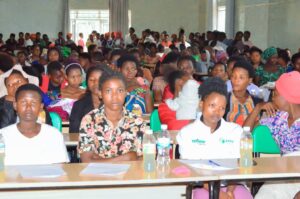Empower Rwanda’s Learning event explores advancements in women’s economic empowerment through financial access for clean cooking.
On 22nd and 23rd May, Empower Rwanda in collaboration Mercy Corps-Energy 4 Impact, held an annual learning event in Kigali to assess the progress of the Financial Inclusion for Clean Cooking in Rwanda and Sierra Leone (FICCARS) programme. Funded by Jersey Overseas Aid, this initiative aims to advance the economic empowerment of women living and working in informal urban settlements through clean cooking solutions and financial services.
Participants, including government representatives, financial institutions, community leaders, and women beneficiaries, engaged in discussions and reflections to evaluate the programme’s strategies, operations, performance, and identify areas for improvement. Esteemed representatives from the Ministry of Environment, Ministry of Infrastructure, the Energy Development Corporation Limited, Development Bank of Rwanda, as well as local leaders from Gasabo and Rwamagana, enriched the sessions with their insights. The participation of women from the targeted communities provided invaluable context and depth to the discussions.


Central to the discussions was the multifaceted approach taken by the FICCARS programme to address women’s challenges in accessing formal financing and clean cooking solutions. The approach uses access to financing and fuels as a pathway for participants to climb the financial ladder, bringing formal financing for their household and business needs into reach.
The Government of Rwanda recognizes the importance of widespread adoption of clean cookstoves and fuels in improving health, preventing environmental degradation, and mitigating the adverse impact of climate change. At the same time, it acknowledges that providing greater financial access enables households, particularly women, to make investments that can lift them out of poverty. At the event, Jean Bosco Mugiraneza, the Acting Director General responsible for energy at the Ministry of Infrastructure, emphasized the need for unified and persistent efforts:
“Whilst the stakes are high, the rewards are even greater. A future where every household in Rwanda has access to clean cooking solutions is within our reach. This future doesn’t just promise cleaner air and healthier lives; it also represents justice, equity, and dignity for all our citizens.”
To achieve its goals, FICCARS fosters a supportive ecosystem, harmonizing efforts among diverse stakeholders. This involves conducting research, assisting clean cooking companies with route-to-market activities, encouraging finance providers to extend their services to underserved populations through innovative financing models, educating consumers about the benefits and proper use of clean energy solutions, and urging local governments to integrate gender inclusion in finance and modern cooking. 






